Document 2: 1841 Letter
Author: Irene Ball
Recipient: Lucinda Ball
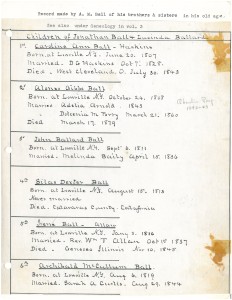
Date: 9 April 1841.
Source: Ball-Curtis Papers, Record Group 30/6, Oberlin College Archives
Document Type: Typed Letter
The following is a transcription of an 1841 letter written in Galesburg, Illinois. It is taken from an earlier transcription of the original letter. In the original, there are asterisks indicating notes typed between lines; here, they have been replaced with regular footnotes.
Galesburg, where Knox College is located, was settled in 1837 by abolitionists from the “Burned-Over District” in upstate New York, a hotbed for reformers and experimental religious communities. It was also a stop on the Underground Railroad. Black students such as Hiram Revels, the first Black congressman, attended Knox College.1
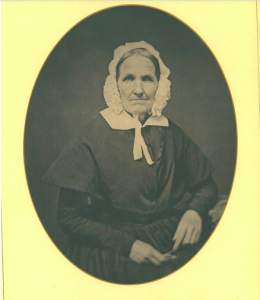
Irene wrote with great sympathy and sensitivity. She wished to comfort her mother over recent events involving her brother Silas. Now four years married, Irene attempted to find common ground between their experiences as women. She often appealed to the particular struggles of motherhood, though Irene is not documented as ever having children. Irene recounted her time in Galesburg, a hub of abolitionist activity. She alluded to involvement in women’s abolitionist organizations and raising money for the Canada Mission, an endeavor started by Hiram Wilson2 to accommodate fugitive slaves in Canada. Irene’s letter also provides details regarding her day-to-day activities on the Antebellum frontier. William Allan included a brief message to Lucinda at the end.
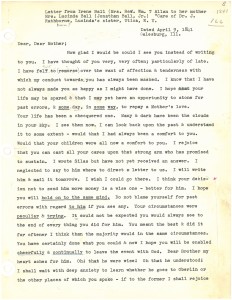
Dear, Dear Mother;
How glad I would be could I see you instead of writing to you. I have thought of you very, very often; particularly of late. I have fell to felt (remorse) over the want of affection & tenderness with which my conduct towards you has always been masked. I know that I have not always made you as happy as I might have done. I hope that your life may be spared & that I may yet have an opportunity to atone for past errors, & some day, in some way, to repay a Mother’s love. Your life has been a checquered [sic] one. Many & dark have been the clouds in your sky. I see them now. I can look back upon the past & understand it to some extent – would that I had always been a comfort to you. Would that your children were all now a comfort to you. I rejoice that you can cast all your cares upon that strong arm who has promised to sustain. I wrote Silas but have not yet received an answer. I neglected to say to him where to direct a letter to us. I will write him & mail it tomorrow. I wish I could go there. I think your decision not to send him more money is a wise one – better for him. I hope you will hold on to the same mind. Do not blame yourself for past errors with regard to him if you see any. Your circumstances were peculiar & trying. It could not be expected you would always see to the end of every thing you did for him. You meant the best & did it far oftener I
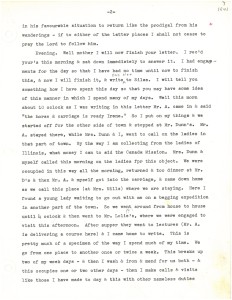
think than the majority would in the same circumstances. You have certainly done what you could & now I hope you will be enabled cheerfully & continually to leave the event with God. Dear Brother my heart aches for him. Oh! that he were wise! Oh that he understood! I shall wait with deep anxiety to learn whether he goes to Oberlin or the other places of which you spoke – if to the former I shall rejoice in his favourable situation to return like the prodigal from his wanderings – if to either of the latter places I shall not cease to pray the Lord to follow him.
Evening. Well mother I will now finish your letter. I rec’d your’s [sic] this morning & sat down immediately to answer it. I had engagements for the day so that I have had no time until now to finish this, & now I will finish it, & write one also to Silas. I will tell you something how I have spent this day so that you may have some idea of this manner in which I spend many of my days. Well this morn about 10 oclock [sic] as I was writing in this letter Mr. A3. came in & said “the horse & carriage is ready Irene.” So I put on my things & we started off for the other side of town & stopped at Mr. Dunn’s4. Mr. A. stayed there, while Mrs. Dunn5 & I, went to call on the ladies in that part of town. By the way I am collecting from the ladies of Illinois, what money I can to aid the Canada Mission. Mrs. Dunn & myself called this morning on the ladies fpr [sic] this object. We were occupied in this way all the morning,
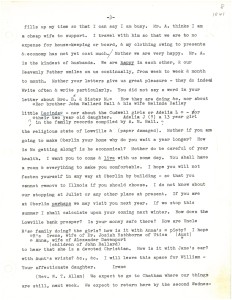
returned & too [sic] dinner at Mr. D’s & then Mr. A. & myself got into the carriage, & came down home as we call this place (at Mrs. Mills) where we are staying. Here I found a young lady waiting to go out with me on a begging expedition in another part of the town. So we went around from house to house until 4 oclock [sic] & then went to Mr. Lolie’s, where we were engaged to visit this afternoon. After supper they went to lectures (Mr. A. is delivering a course here)6 & I came home to write. This is pretty much of a specimen of the way I spend much of my time. We go from one place to another once or twice a week. This breaks up two of my week days – & then I wash & iron & mend for us both – & this occupies one or two other days – then I make calls & visits like those I have made to day [sic] & this with other nameless duties fills up my time so that I can say I am busy. Mr. A thinks I am a cheap wife to support. I travel with him so that we are to no expense for house-keeping or board, & my clothing owing to presents & economy has not yet cost much. / Mother we are very happy. Mr. A. is the kindest of husbands. We are happy in each other, & our Heavenly Father smiles on us continually, from week to week & month to month. Mother your letters give us great pleasure – they do indeed. Write often & write particularly. You not say a word in your letter about Bro. B. & Sister M. How are they doing &c. nor about little Lucinda – nor about the Cudwell girls or Adelia L7 nor the religious state of Lowville & (paper damaged). Mother if you are going to make Oberlin your home why
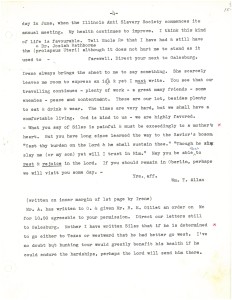
do you wait a year longer? How is Mc8 getting along? is he economical? Mother do be careful of your health. I want you to come & live with us some day. You shall have a room & everything to make you comfortable. I hope you will not fasten yourself in any way at Oberlin by building – so that you cannot remove to Illinois if you should choose. I do not know about our stopping at Juliet9 or any other place at present. If you are at Oberlin perhaps we may visit you next year. If we stop this summer I shall calculate upon your coming next winter. How does the Lowville bank prosper? Is your money safe there? How are Uncle R’s10 family doing? the girls? how is it with Anna’s piety?11 I hope to hear that she is a devoted Christian. How is it with Jane’s ear? with Aunt’s wrists? &c., &c. I will leave this space for William –
Your affectionate daughter. Irene
(Rev. W. T. Allan) We expect to go to Chatham12 where our things are still, next week. We expect to return here by the second Wednesday in June, when the Illinois Anti Slavery Society commences its annual meeting.13 My
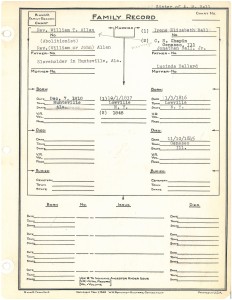
health continues to improve. I think this kind of life is favourable. Tell Uncle R that I have had & still have the (prolapsus Uteri)14 although it does not hurt me to stand as it used to – farewell. Direct your next to Galesburg.
Irene always brings the sheet to me to say something. She scarcely leave me room to express an idea & yet I must write. You see that our travelling continues – plenty of work – a great many friends – some enemies – peace & contentment. There are our lot, besides plenty to eat & drink & wear. The times are very hard, but we shall have a comfortable living. God is kind to us – we are highly favored. – What you say of Silas is painful & must be exceedingly to a mother’s heart. But you have long since learned the way to the Savior’s bosom. “Cast thy burden on the Lord & he sustain thee.”15 “Though he slay me (or my son) yet will I trust in Him.”16 May you be able thus to rest & rejoice in the Lord. If you should remain in Oberlin, perhaps we visit you some day. –
Yours affectionately, Wm. T. Allan
(Written in the inner margin on 1st page)
Mr. A. has written to O. & given Mr. R. E. Gillet17 an order on Mc for 10.00 agreeable to your permission. Direct our letters still to Galesburg. Mother I have written Silas that if he is determined to go either to Texas or westward that he had better go west. I’ve no doubt but hunting tour would greatly benefit his health if he could endure the hardships, perhaps the Lord will send him there.
Transcribed by Juliet Vincente
1 “Blacks in Galesburg,” Knox College Library Special Collections and Archives, web address, accessed March 2015.
2Wilson (1803-1864) was a “Lane Rebel” from New Hampshire who attended Oberlin, receiving a Theological degree in 1836. He was involved in abolitionism his whole life (“Hiram Wilson,” Lane Debates, Oberlin.edu, web address, accessed 18 August 2015).
3 William Allan.
4 James F. Dunn, mayor of Galesburg from 1861 to 1863. (“Knox College Timeline.” Knox College, accessed 30 July 2015, Web address.)
5 Sarah Dunn (née Fiske), one of the first three women to graduate from the Female Collegiate Department in 1850. (Martha Webster, Seventy-five significant years. The story of Knox college 1837-1912 (Galesburg, IL: Wagoner Printing Co., 1912)).
6 W.T. Allan was appointed as a General Lecturer for the Illinois Anti-Slavery Society (Hermann R. Muelder, Fighters for Freedom: The History of Anti-Slavery Activities of Men and Women Associated with Knox College (New York, NY: Columbia University Press, 1959, 94)).
7 13-year-old girl, according to family records. (From transcriber.)
8 Mack, or Archibald.
9 Most likely a spelling mistake in the letter. She is probably referring to Joliet, Illinois, which was the location of the Illinois Anti-Slavery Society interim convention in February 1840 (Muelder, Fighters for Freedom, 143).
10 Dr. Josiah Rathborne (1795-?), married Lucinda Ballard’s sister Irene Ballard (died 1856 in 1824. (Jefferson County New York, Jefferson County Migrations, Migrations Part 49.)
11 Wife of Alexander Davenport (children of John Ballard).
12 William T. Allan resided in Chatham, Illinois in Sangamon County in his first years as agent for the Illinois Anti-Slavery Society. (Muelder, Fighters for Freedom, 95).
13 Auxiliary to the American Anti-Slavery Society. It was the first organization established in the frontier town on 4 July 1837. W.T. Allan attended the first-anniversary celebration of the Anti-Slavery Society in Farmington, Illinois and assumed a position as agent of the Society until the position became defunct (Muelder, Fighters for Freedom, 145)).
14 Although William’s name is typed before this paragraph, Irene likely wrote it because of the mention of a prolapsed uterus. She probably experienced multiples miscarriages, to which this problem would have been related. Allan probably wrote the next paragraph.
15 Psalms 55:22.
16 Job 13:15.
17 R.E. Gillett, publisher of the Oberlin Evangelist.